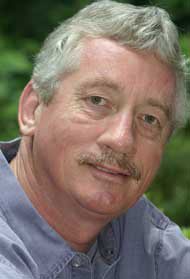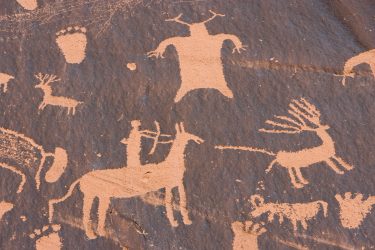Tools for Discovery is a monthly profile series that inspects the computer programs, gadgets and methods behind WID’s ideas and discoveries.
Frans de Waal is the C.H. Candler Professor of Primate Behavior at Emory University and author of numerous popular books on non-human primate behavior and research. De Waal dropped by our Institute while visiting C4 Co-Directors David Krakauer and Jessica Flack, where he shared his thoughts on the science of morality.

What do you work on?
My research team is small, but I used to have two labs — one at the field station outside the city of Atlanta, and one was at the Yerkes main center [at Emory University]. Basically, the whole day we would run behavioral experiments or observations on the primates. In the beginning, of course I ran things myself, especially here in Wisconsin at the Vilas Park Zoo — I did a lot of the observations myself. Of late, my task is more to coordinate with students and ask, “What are you doing and what did you find?”
Another part of my task is to teach, so twice a week I’m on campus at Emory to teach a large class with students there. And then I write books, and I do that mostly in the evenings and on the weekends.
What are your tools for analysis?
Well, data analysis I do in Excel most of the time, and I am a very primitive Unix programmer, so I do that as well. I usually have people around me who are much better, so at the moment I have a technician who programs in R and does things very rapidly, so before I’ve even formulated the questions she’s already writing the program. For myself, the tools of analysis are pretty simple, like Excel and SPSS and things like that.
Tools for writing?
I write just in a Word document. Say I have a burst of writing of 2,000 words or something, and then for the next 5 days, I keep weeding things out and rephrasing things and adding things, and so I keep shifting.
“A good observer also takes in all the surrounding events. I often compare it to a sports narrator for a football or basketball game. You need to keep your eyes on everything that’s going on, not just the ball-possessor because that’s not always the most important individual.”
— Frans de Waal
When I write a book, a chapter may take me two months, and then I decide this chapter’s done and then I barely look back at it and then I move on to the next one. I’m writing in a foreign language for me, English, so I’m always sort of insecure about which words to use. And also I feel it needs to read very smoothly, because it’s a popular book most of the time. So my wife reads it at some point, and then she comes back and says, “Well this part was boring, or this was too much jargon.”
Tools for collaboration?
I would prefer face-to-face interaction, if possible. Skype doesn’t really do it for me. Skype is very nice in many ways, but I’m not using that so much. If I look at my publication list, there’s a huge amount of names there that aren’t always my students. And so I do have collaborations that are sometimes unexpected, like recently two papers came out in Animal Behavior and were written by a young student from Buffalo, New York, who came to dig into my old data and started analyzing it.
Your ultimate tool for discovery?
For me, it’s observation. I need to see something happening that puzzles me or intrigues me or challenges an established idea. Everything I do has basically started with the observation of animals. For example, once I think they share food in a particular way, then I can set up a food sharing experiment to test it out.
I think a really good observer can take in a lot of extra information. If during an ongoing social encounter you focus too much on one individual that you’re interested in, you don’t see the other ones coming when they attack or recruit or something. So a good observer also takes in all the surrounding events. I often compare it to a sports narrator for a football or basketball game. You need to keep your eyes on everything that’s going on, not just the ball-possessor because that’s not always the most important individual. So you need to focus but at the same time take everything in.
Sometimes people in our field look down on anecdotes, they say, “Oh that’s just an anecdote,” but an anecdote by a good observer — say Jane Goodall — I’m willing to believe because she knows what she’s talking about. The source is critically important, and nowadays we often have video to back it up.


You must be logged in to post a comment.